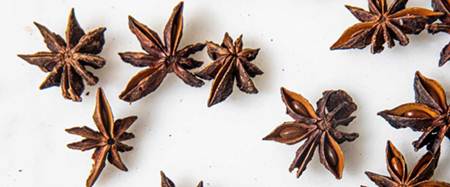Star anise, known for its culinary and aromatic uses, also holds various potential benefits for skincare. While there is limited scientific research focused specifically on star anise for skin whitening, it contains compounds that may contribute to enhancing the skin’s appearance. In this article, we will explore the potential benefits of star anise for skin whitening, examining its potential antibacterial effects, antioxidant properties, anti-inflammatory benefits and skin lightening effects. It’s important to note that individual results may vary, and professional advice should be sought for personalized skincare guidance.
Benefits of Star Anise for Skin Whitening

1. Skin lightening effects
Star anise contains a compound called anethole. This compound exhibits tyrosinase inhibitory activity. Tyrosinase is an enzyme involved in the melanin production, and melanin is the pigment responsible for skin color. By inhibiting the activity of tyrosinase, star anise may help reduce melanin production, potentially resulting in a lighter complexion. However, it’s important to note that the effectiveness of star anise as a skin lightening agent may vary among individuals. Additionally, its use should be in consultation with a skincare professional and approached with caution.
2. Antioxidant properties
Star anise is packed with antioxidants, including flavonoids and phenolic compounds. These antioxidants help protect the skin from damage caused by free radicals, which can lead to skin discoloration and a dull complexion. By neutralizing free radicals, star anise contributes to overall skin health, potentially resulting in a brighter and more even skin tone. Incorporating star anise into your skincare routine, either as a topical treatment or by consuming star anise-infused beverages, may provide antioxidant benefits that support a more radiant complexion.
3. Potential antibacterial effects
Star anise possesses antimicrobial properties attributed to compounds like eugenol and anethole. These properties may help prevent blemishes and combat acne-causing bacteria. By reducing inflammation and breakouts, star anise indirectly contributes to a more even skin tone. However, it’s important to note that seed pod should not replace traditional acne and pimple treatments, and its use should be discussed with a skincare professional or dermatologist.
4. Anti-inflammatory properties
Inflammation can contribute to an uneven skin tone and skin discoloration. Star anise contains compounds like quercetin and anethole, which have anti-inflammatory properties. These properties can help soothe and calm the skin, promoting a more even complexion and reducing redness. By reducing inflammation, star anise may indirectly support the goal of achieving more uniform and a brighter skin tone.
Best Practices and Precautions
When considering the use of star anise for skin whitening purpose, it’s important to follow these precautions and best practices:
- Patch test: Before applying star anise topically, do a patch test on a small area of your skin to check for any allergies or adverse reactions.
- Consult a professional: Seek guidance from a skincare professional or dermatologist to address any specific conditions or concerns and assess the suitability of star anise for your skin type and
- Moderation: As with any skincare ingredient, moderation is key. Incorporate star anise into your skincare routine in appropriate frequencies and amounts to avoid any potential adverse effects.
- Sun protection: Regardless of using any skin whitening method or star anise, always prioritize sun protection by using broad-spectrum sunscreen to maintain overall skin health and prevent further skin discoloration.
How to apply star anise on skin?
Applying star anise directly on the skin is not recommended. However, you can incorporate star anise into your skincare routine in the following ways:
- Infused oil: Create a star anise-infused oil by steeping star anise in carrier oil (such as coconut oil, olive oil, jojoba or almond oil) for several weeks. Strain the oil and use it as a massage oil or moisturizer.
- Facial steam: Add star anise to boiling water and allow the steam to envelop your face for a couple of minutes, helping to enhance circulation and open pores.
- Herbal bath: Place star anise in a bath sachet or a muslin bag and add it to your bathwater for natural a soothing and aromatic experience. Remember to avoid direct contact with the skin.
Conclusion
While star anise holds several potential benefits for skin whitening, it’s important to approach its use with caution. Its potential antibacterial effects, antioxidant properties, anti-inflammatory benefits, and skin lightening effects, contribute to its potential as a skincare ingredient. However, professional advice should be sought and individual results may vary. As with any skincare regimen, a holistic approach that includes a proper skincare practices, balanced diet, and consultation with skincare professionalswill yield the best results for achieving an even and radiant skin tone.


